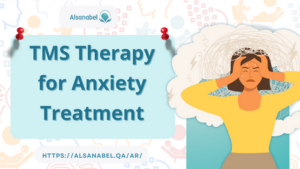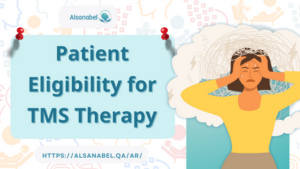How TMS Therapy is Revolutionizing Anxiety Treatment? 2024
- Category TMS Session
Transcranial Magnetic Stimulation (TMS) therapy, a non-invasive procedure using magnetic fields to stimulate brain nerve cells, offers hope for those with anxiety disorders. Recent studies show substantial symptom improvements in patients with generalized anxiety disorder undergoing TMS treatment. Importantly, these benefits aren’t solely tied to antidepressants, signaling a potential shift in anxiety treatment paradigms. With each study, we gain deeper understanding of how TMS not only relieves symptoms but also transforms mental health care approaches.
Table of Contents
ToggleTMS Therapy for Anxiety Treatment
Transcranial Magnetic Stimulation (TMS) works for anxiety treatment by targeting specific areas of the brain involved in the regulation of emotions and stress responses. Here’s a more detailed explanation of how TMS sessions is thought to work in the context of anxiety:

- Brain Circuitry: Anxiety disorders involve dysregulation in brain circuits processing emotions and stress, including the amygdala and prefrontal cortex.
- Neurotransmitter Function: TMS may modulate neurotransmitter activity, such as serotonin and GABA, linked to mood regulation and anxiety symptoms.
- Neuroplasticity: TMS induces neuroplastic changes, reshaping neural connections in response to stimulation and promoting healthier emotional regulation circuits.
- Cortical Excitability: By adjusting cortical activity, particularly in regions like the dorsolateral prefrontal cortex, TMS helps normalize abnormal neural patterns associated with anxiety.
- Functional Connectivity: TMS enhances communication between brain regions involved in emotion regulation, improving overall connectivity and reducing anxiety symptoms.
- Long-Term Effects: Beyond immediate effects, TMS fosters lasting neuroplastic changes, providing sustained relief from anxiety symptoms even after treatment completion.
TMS Therapy Versus Traditional Anxiety Treatments
Comparing TMS therapy with traditional anxiety treatments offers insights into their respective advantages and limitations. Here’s a breakdown:
1-Efficacy:
- Traditional Treatments: Traditional treatments for anxiety disorders include psychotherapy (e.g., cognitive-behavioral therapy) and medication (e.g., SSRIs, benzodiazepines). These treatments have been extensively studied and are considered effective for many individuals with anxiety disorders.
- TMS: TMS therapy is a relatively newer treatment option for anxiety disorders, and while research is ongoing, studies suggest it may be effective, especially for individuals who have not responded adequately to traditional treatments. However, the evidence base for TMS in anxiety is still developing, and its efficacy compared to traditional treatments may vary depending on individual factors.
2-Mechanism of Action:
- Traditional Treatments: Psychotherapy aims to modify maladaptive thought patterns and behaviors associated with anxiety through cognitive restructuring and exposure techniques. Medications primarily target neurotransmitter systems in the brain to alleviate symptoms of anxiety.
- TMS: TMS sessions works by directly modulating neural activity in specific brain regions implicated in anxiety disorders, such as the prefrontal cortex. It may promote neuroplastic changes in the brain and normalize aberrant neural circuitry associated with anxiety.
3-Side Effects:
- Traditional Treatments: Medications used to treat anxiety can have side effects, including nausea, dizziness, drowsiness, and sexual dysfunction. Long-term use of some medications, such as benzodiazepines, may also be associated with dependency and withdrawal symptoms.
- TMS: TMS is generally considered safe, with few systemic side effects. The most common side effects are mild and transient, such as headache or discomfort at the treatment site. However, there is a small risk of inducing seizures, particularly in individuals with a history of epilepsy or seizures.
4-Treatment Duration:
- Traditional Treatments: The duration of traditional treatments for anxiety can vary widely depending on the type of therapy or medication used, as well as individual response to treatment. Psychotherapy may involve weekly sessions over several months, while medication may require ongoing management and monitoring.
- TMS: TMS typically involves a series of daily sessions over several weeks, with each TMS session lasting about 20-30 minutes. The total duration of treatment may range from 4 to 6 weeks, depending on the individual’s response and treatment protocol.
5-Patient Preferences and Accessibility:
- Traditional Treatments: Some individuals may prefer psychotherapy over medication due to personal preferences, beliefs, or concerns about side effects. Access to specialized psychotherapy may also be limited depending on factors such as availability of trained therapists and insurance coverage.
- TMS: TMS may appeal to individuals who prefer non-pharmacological treatments or who have not responded to traditional interventions. However, access to TMS therapy may be limited by factors such as availability of TMS clinics, insurance coverage, and cost.
Patient Eligibility for TMS Therapy
Determining patient eligibility for Transcranial Magnetic Stimulation (TMS) therapy for anxiety disorders typically involves several factors:

- Diagnosis: The patient should have a confirmed diagnosis of an anxiety disorder, such as generalized anxiety disorder (GAD), social anxiety disorder (SAD), panic disorder, or obsessive-compulsive disorder (OCD). A comprehensive psychiatric evaluation by a qualified mental health professional is necessary to establish the diagnosis and assess the severity of symptoms.
- Treatment Resistance: TMS therapy for anxiety is often considered for individuals who have not responded adequately to first-line treatments, such as psychotherapy (e.g., cognitive-behavioral therapy) and medication (e.g., selective serotonin reuptake inhibitors or SSRIs). Treatment resistance may be defined as persistent symptoms despite adequate trials of multiple medications or psychotherapeutic interventions.
- Severity of Symptoms: TMS therapy may be appropriate for individuals with moderate to severe anxiety symptoms that significantly impair their daily functioning and quality of life. The severity of symptoms, as well as the impact of anxiety on social, occupational, and interpersonal functioning, should be carefully evaluated to determine the appropriateness of TMS as a treatment option.
- Safety Considerations: Certain medical and psychiatric conditions may affect the safety and suitability of TMS therapy. Patients with a history of seizures or epilepsy may require additional precautions, as TMS treatment can potentially lower the seizure threshold. Similarly, individuals with implanted medical devices (e.g., pacemakers, cochlear implants) or metal objects in or around the head may not be eligible for TMS due to safety concerns.
- Medical History: A comprehensive medical history, including information about current medications, past treatments, and any co-existing medical conditions, should be assessed to ensure that TMS therapy is safe and appropriate for the patient. Certain medical conditions or medications may interact with TMS or increase the risk of adverse effects.
- Patient Preference: Patient preference and willingness to undergo TMS therapy are also important considerations. Patients should be provided with information about the procedure, its potential benefits and risks, and alternative treatment options to make an informed decision about their care.
As we conclude our exploration of TMS Therapy for anxiety treatment, we aim to illuminate its potential benefits and the evolving landscape of mental health care. Beyond research, our focus remains on the real-world impact for individuals grappling with anxiety. We invite you to join the dialogue—share your experiences, questions, and insights related to TMS sessions. Your contributions enrich our collective understanding and support network for those seeking innovative treatment options. Let’s collaborate in shaping the future of anxiety treatment together.









